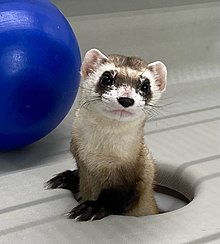Elizabeth Ann
 Elizabeth Ann in 2021 | |
| Species | Black-footed ferret |
|---|---|
| Sex | Female |
| Born | December 10, 2020 Carr, Colorado |
| Known for | The first cloned black-footed ferret. |
Elizabeth Ann (born December 10, 2020) is a black-footed ferret, the first U.S. endangered species to be cloned.[1][2] The animal was cloned using the frozen cells from Willa, a black-footed female ferret who died in the 1980s[3] and had no living descendants.[4] The cloning process was led by Revive & Restore, a biodiversity non-profit.[5]
Background
[edit]Black-footed ferrets are the only ferret species native to the United States.[6] The black-footed ferret is one of the most endangered and rarest land mammals in North America; a small pack of them was found in Wyoming in 1981.[7] The limited genetic diversity found among the pack put the species at risk. Scientists sent genetic material from Willa to San Diego Zoo’s Frozen Zoo in 1988. Willa's egg was implanted in a surrogate domestic ferret in November 2020, to avoid putting an endangered ferret at risk.[8] Elizabeth Ann was delivered via c-section on December 10.[9]
Life
[edit]Elizabeth Ann will live in Colorado[10] and be studied for scientific purposes; she will not be released into the wild.[11] By February 2022, Elizabeth Ann had reached puberty and scientists were looking for a viable mate.[12] A panel discussion, organized by the Draper Natural History Museum in October 2022, informed the public that Elizabeth Ann had a hysterectomy for unspecified reasons, but also that other clones were on their way.[13] Elizabeth Ann remained healthy but was unable to breed due to hydrometra, a condition causing fluid retention within the uterus, alongside an underdeveloped uterine horn. As these conditions are common in black-footed ferrets, they are not believed to be linked to the cloning process.[14]
Other clones
[edit]In April 2024, the U.S. Fish and Wildlife Service announced the birth of two new black-footed ferret clones, Noreen and Antonia, who were cloned from the same genetic material as Elizabeth Ann. Noreen was born at the National Black-footed Ferret Conservation Center in Colorado, while Antonia resides at the Smithsonian's National Zoo & Conservation Biology Institute near Front Royal, Virginia. Both were healthy and reaching expected developmental and behavioral milestones. The Service and its research partners planned to breed Noreen and Antonia once they reached reproductive maturity later in 2024.[14] Antonia gave birth to a litter of three kits in June 2024, two of which (one female, one male) survived.[15]
See also
[edit]References
[edit]- ^ "Elizabeth Ann the Black-Footed Ferret Is the First-Ever Cloned Endangered U.S. Species". PEOPLE.com. Retrieved 2021-02-21.
- ^ "'She's just perfect,' says scientist who helped clone an endangered ferret | CBC Radio". CBC. Retrieved 2021-02-21.
- ^ "Innovative Genetic Research Boosts Black-footed Ferret Conservation Efforts by USFWS and Partners". www.fws.gov. Retrieved 2021-02-21.
- ^ "Ferret becomes first North American endangered species to be cloned". BBC News. 2021-02-19. Retrieved 2021-02-21.
- ^ "Elizabeth Ann, the first cloned ferret, spurs hope for endangered U.S. species". Reuters. 2021-02-20. Retrieved 2021-02-21.
- ^ Desk, Bob D'Angelo, Cox Media Group National Content (19 February 2021). "Hello, Elizabeth Ann: Black-footed ferret is first endangered US animal to be cloned". KOKI. Retrieved 2021-02-21.
{{cite web}}:|last=has generic name (help)CS1 maint: multiple names: authors list (link) - ^ Rob Picheta (19 February 2021). "Scientists clone an endangered American animal for the first time". CNN. Retrieved 2021-02-21.
- ^ "First US Endangered Animal Cloned: Elizabeth Ann the Ferret". spectrumlocalnews.com. Retrieved 2021-02-21.
- ^ Imbler, Sabrina (2021-02-18). "Meet Elizabeth Ann, the First Cloned Black-Footed Ferret". The New York Times. ISSN 0362-4331. Retrieved 2021-02-21.
- ^ "Black-footed ferret named Elizabeth Ann becomes 1st endangered American animal to be cloned". ABC7 Los Angeles. 2021-02-19. Retrieved 2021-02-21.
- ^ "Meet Elizabeth Ann, the genetic copy of a ferret that died more than 30 years ago". www.abc.net.au. 2021-02-19. Retrieved 2021-02-21.
- ^ "Wanted: virile but gentle mate for the world's first cloned black-footed ferret". www.theguardian.com. 2022-02-06. Retrieved 2023-01-13.
- ^ Davis, Mark (4 October 2022). "Panel discusses history of black-footed ferret rescue: Efforts continue to save the species". Powell Tribune. Retrieved 2023-01-25.
- ^ a b Szuszwalak, Joe (2024-04-17). "Innovative Cloning Advancements for Black-footed Ferret Conservation". U.S. Fish and Wildlife Service. Retrieved 2024-05-08.
- ^ Welk, Martin (November 1, 2024). "Cloned ferret gives birth in Va., making history, U.S. officials say". The Washington Post. Yahoo. Retrieved November 6, 2024.
